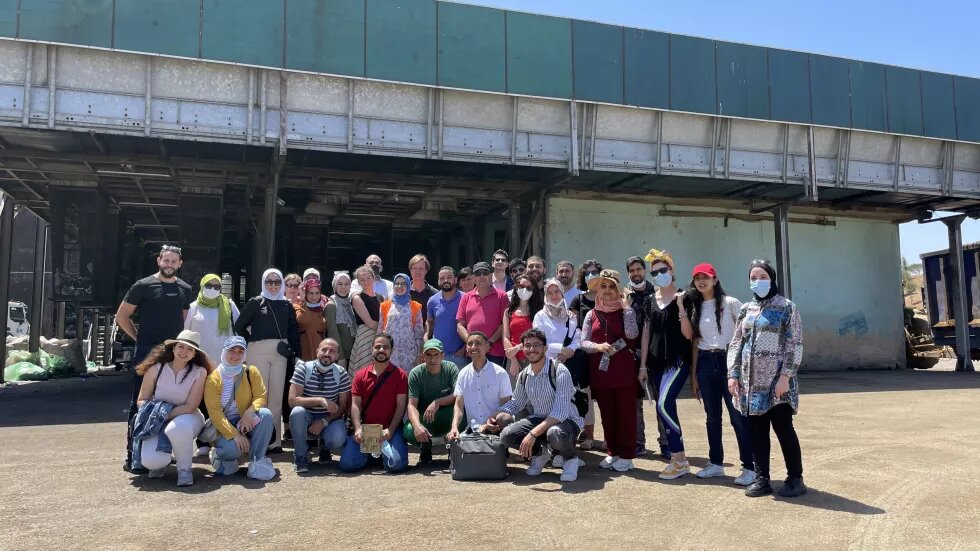Heinrich Böll Foundation Offices in Rabat, Tunis, Beirut and Ramallah held the 8th Regional Summer School on solid waste management in Rabat – Morocco.

At the 8th Regional Summer School of the Heinrich Böll Foundation, 23 young activists, researchers and civil society actors from different countries in the MENA region got together in Rabat, Morocco for one week to discuss and develop sustainable approaches to solid waste management.
The management of municipal solid waste has become one of the major challenges in the MENA region. Rapidly expanding cities like Cairo, Casablanca or Beirut are confronted with ever-growing quantities of waste. At the same time governance schemes, collection systems and waste treatment are often poor or struggling to cope. This creates huge environmental and social challenges. Managing waste and minimizing associated environmental impacts has become one of the central concerns in MENA countries.
Against this background, the offices of the Heinrich Böll Foundation in Rabat, Tunis, Ramallah and Beirut organized from 26 June to 1 July 2022 a Summer School under the title “Waste Less, Manage Better: Exploring Municipal Solid Waste Management in the MENA Region”, gathering 23 young researchers, civil society actors and young professional from Lebanon, Syria, Palestine, Jordan, Egypt, Tunisia and Morocco. Through an interdisciplinary perspective, the Summer School addressed various topics related to municipal solid waste management in the MENA region. The participants learned more about sustainable approaches of waste management through lectures and exchanges with practitioners, engaged in discussions and group work sessions on the respective situation of waste management in different countries, and got to know inspiring initiatives and best practices in the field of waste management in the MENA region.
The major topics examined during the Summer School were the following:
The first day was dedicated to the status quo of waste management in the different countries of the region and international conventions on solid waste management. Among others, Walim Mardassi, a Tunisian waste management expert, introduced the existing international frameworks that inform national laws on waste management. Afterwards participants discussed concrete cases from their respective countries, such as the illegal transport of Italian waste to Tunisia and the deposal of Israeli waste in the occupied West Bank.
The second day of the Summer School revolved around production and consumption patterns that determine to a large extent how much waste will be generated by households. The sessions of this day looked into the impacts of product design, explored the relations between consumer habits and waste generation and presented the basic principles of a zero waste approach. A particular focus was placed on plastic and its various negative effects. Therefore, the group discussed the different harmful dimensions of plastic using the “Plastic Atlas” produced by the Heinrich Böll Foundation. Additionally, Nathan Dufour from Zero Waste Europe gave an input on pilot initiatives in European cities that aim at reducing single-use plastic items.
On the third day, all participants went on a field trip to the landfill Oum Azza near Rabat to visit the cooperative Attawafouq. The cooperative regroups former informal waste pickers, who previousely worked in precarious conditions, but have jointly built a waste separation plant and are now successfully selling the separated raw materials to recycling companies. This way, the participants learned about the processing of waste and the different stages of solid waste management, from waste collection to waste disposal as well as recycling schemes. This was complemented in the afternoon by an exchange with the Lebanese entrepreneur Georges Bitar, who has built up a successful business in Beirut with his start-up Love Live Recycle. In addition to that, Sukaina Khalawi, from the Palestinian organization Women Media and Development (TAM) presented on the gender-specific impacts of the indiscriminate burning of electronic waste in Palestine.
The next day was dedicated to the circular economy approach. The sessions explained how the current economic model with its domination of linear value chains is at the root of our waste problem. Therefore, in order to manage waste better, a green circular economy could be considered a sustainable solution. In this regard, the Moroccan expert and civil society actor Abderrahim Ksiri and the researcher Amani Maalouf presented entry point for moving towards a more circular model of doing business and dealing with waste in the MENA region.
The final day of the Summer School dealt with waste governance in MENA countries and raised the question of how the current policies and processes could be rendered more participatory. A round table with different successful initiatives from Morocco, Tunisia and Lebanon presented concrete initiatives and best practices for changing the mainstream governance patterns and move to a more community-based approach to managing waste.
The program of this year’s Summer School has been practice-oriented and aimed at enhancing the capabilities of participants in working with local communities as well as with their counterparts in local governance. Beside thematic inputs from experts, the Regional Summer School has engaged different stakeholders (decision-makers, civil society initiatives, entrepreneurs, etc.) and provided a space for co-creation of ideas. The Summer School was an opportunity for participants to enhance their skills on how to adopt interdisciplinary and inclusive approaches that could emerge from a multi-stakeholder dialogue and lead to a socio-environmental change regarding municipal solid waste management in the MENA region.
At the same time, the Summer School has been a unique opportunity to exchange and learn about the challenges and achievements regarding waste management in the different countries of the region, to network with like-minded change makers from other countries and to create relationships in their common pursuits for a better municipal solid waste management in the MENA region.







